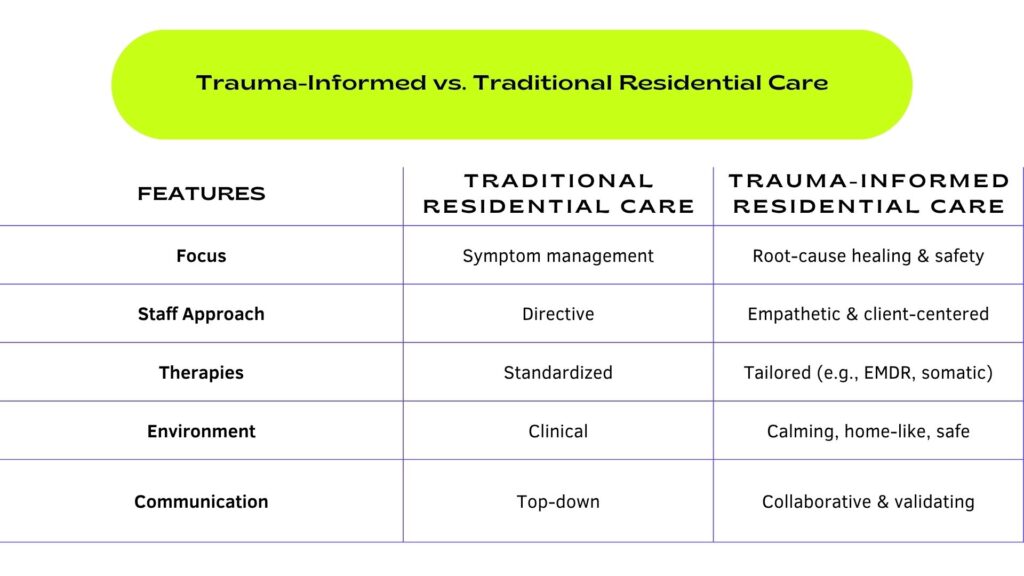Trauma can feel like a heavy shadow, affecting every part of daily life. It can be confusing, isolating, and difficult to even know where to begin looking for help. If you or someone you love is living with traumatic stress, finding the right kind of care matters. Trauma-informed residential treatment offers a long-term, supportive environment where healing doesn’t just happen—it’s nurtured, step by step. An estimated 70% of adults in the U.S. have experienced at least one traumatic event in their lives.
Trauma-informed residential treatment combines 24/7 structured support with an approach grounded in emotional safety, empowerment, and trust. It ensures that every part of care—from therapy to staff interactions—is designed to meet the needs of individuals affected by trauma.
What Is Trauma-Informed Residential Treatment?
Trauma-informed residential treatment is a long-term, live-in mental health treatment model that prioritizes safety, empowerment, and trust throughout every aspect of care.
Unlike standard residential programs, this approach embeds trauma sensitivity into the foundation of its structure. Staff are trained to understand the effects of trauma, and the physical environment, therapies, and daily routines are all designed to help clients feel safe and supported.
Core principles include:
- Safety: Emotional and physical safety are prioritized to reduce the risk of retraumatization.
- Empowerment: Clients are encouraged to have a voice in their treatment.
- Trustworthiness: Boundaries are clear, and communication is transparent.
- Collaboration: Staff and clients work together in decision-making.
- Cultural Humility: Programs respect each individual’s background and identity.
A 2024 study by Walter et al. showed that trauma-informed residential treatment improves mental health and substance use outcomes, enhances staff satisfaction, and increases overall program effectiveness.
Why Does This Type of Treatment Matter?
Trauma-informed residential treatment matters because it gives people a chance to heal in a setting built around safety and compassion. Trauma changes the brain. It affects how a person responds to stress, how they trust others, and how they regulate emotions. Many individuals living with trauma also experience co-occurring mental health disorders like PTSD, anxiety, or substance use issues.
Residential treatment centers who provide a trauma-informed setting are uniquely equipped to handle this complexity. The consistent, structured environment helps clients rebuild a sense of stability, while trauma-informed therapists offer therapies that avoid triggering or retraumatizing clients. A 2019 study by Hales et al. found that implementing trauma informed care in residential treatment settings improved organizational climate and increased client satisfaction and treatment retention.
Common Questions and Misunderstandings
How is trauma therapy different from regular therapy?
Trauma therapy is tailored to help people process and heal from traumatic experiences. Unlike regular talk therapy, trauma informed therapy integrates evidence-based techniques like EMDR or somatic therapy, and it moves at the client’s pace to avoid overwhelm.
What is the difference between residential and inpatient treatment?
Residential treatment is typically long-term and less medically intensive, focusing on emotional and psychological healing in a homelike setting. Inpatient treatment, on the other hand, is short-term and often used during a crisis or for medical stabilization.
Can trauma-informed care help with PTSD, anxiety, or addiction?
Yes. Many people with trauma also struggle with PTSD, anxiety, depression, or substance use. Trauma informed care in residential treatment is especially helpful because it addresses both the trauma and related mental health conditions.
“Residential treatment is only for severe mental illness or crisis.”
Not true. While residential treatment centers do support people with serious conditions, trauma-informed residential programs also help individuals who need a stable, long-term space to heal from complex trauma and life disruptions.
“You have to talk about your trauma right away to get better.”
Absolutely not. Trauma-informed care works at your pace. You don’t have to talk about your trauma until you feel safe and ready. The goal is to build trust and emotional safety first.

How Does Trauma-Informed Residential Treatment Work?
Trauma-informed care in residential settings ensures safety and support at every level of treatment. A key component of trauma informed care in residential settings safety is creating predictable routines and emotionally responsive environments that help clients feel grounded and secure.
Here’s how a trauma-informed residential program is structured:
- Active listening and emotional validation: Clients are heard without judgment.
- Staff trained in trauma-responsive care: Every interaction considers trauma impact.
- Consent-based, client-centered practices: You have a say in your own healing.
- Integrative therapies: Programs often include CBT, EMDR, somatic practices, and mindfulness.
- 24/7 support: Structured routines and peer communities offer consistent safety.
These components create a treatment facility that supports deep healing. Whether you’re managing a mental health disorder, substance use, or unresolved trauma, trauma informed care in residential settings prioritizes healing without pressure.
What is trauma-informed care in residential treatment?
Trauma-informed care in residential treatment is a live-in approach that centers emotional and physical safety, trust, and empowerment. It recognizes how trauma shapes behavior and healing, so every aspect of care—from staff interactions to daily routines—is built to reduce retraumatization and support recovery at a steady, respectful pace.
What is a trauma-informed approach to treatment?
A trauma-informed approach to treatment means understanding that trauma affects the whole person—mind, body, and behavior. This model prioritizes emotional safety, transparency, and collaboration. Clients are given choices, treated with compassion, and supported by therapists who are trained to respond to trauma with empathy and without judgment.
What are the 5 principles of trauma-informed care?
The five core principles of trauma-informed care are:
- Safety – ensuring clients feel physically and emotionally secure
- Trustworthiness – fostering clear and consistent communication
- Empowerment – supporting autonomy and strengths
- Collaboration – involving clients in their care
- Cultural Humility – respecting diverse backgrounds and identities
What is the difference between residential and inpatient treatment?
Residential treatment provides long-term, structured support for emotional healing, often in a home-like setting. It focuses on mental health, trauma, or addiction recovery. Inpatient treatment is more short-term and medically intensive—typically used during psychiatric or detox crises where 24/7 medical supervision is required for stabilization.
Is residential treatment only for severe mental illness?
No. While residential treatment can help with severe conditions, it’s also ideal for people with complex trauma, anxiety, PTSD, substance use, or co-occurring disorders. It offers a consistent, healing space for anyone needing more support than outpatient care can provide—even if they’re not in immediate crisis.
Taking the Next Step Toward Healing
If you’re still asking, “Do I have to talk about my trauma in therapy?” or “Is residential treatment only for severe mental illness?” — know that you’re not alone in wondering. Many people feel unsure, overwhelmed, or unready to take that first step. That’s okay.
Trauma-informed care meets you where you are. Whether you need short-term stabilization or long-term healing, residential treatment programs designed for trauma create space to breathe, rest, and grow—on your own timeline.
Start Your Journey Towards Healing at Rock View Recovery
Trauma doesn’t have to define your future. With the right care in a safe and compassionate setting, healing is possible. Trauma-informed residential treatment offers a life-changing opportunity to step out of survival mode and into a new way of living.
At Rock View Recovery, our residential treatment center is built around trauma informed care, dignity, and respect. Our informed therapists and evidence-based programs are here to support you, every step of the way.
Quick Tip: Feeling Overwhelmed by Treatment Options?
It’s completely normal to feel unsure about where to start. Ask yourself: Do I feel safe, supported, and seen where I am now? If not, a trauma-informed residential program like Rock View Recovery could offer the space and care you need to begin healing.
Key Takeaways
- Trauma-informed residential care combines structure, trust, and emotional safety.
- Residential treatment centers who provide a trauma-informed setting help people heal from traumatic stress and mental health disorders.
- You don’t need to be in crisis to benefit from residential care.
- Therapies like EMDR and somatic work are used to avoid retraumatization.
- This type of program supports recovery from PTSD, addiction, anxiety, and more.
- Healing is possible, even if you don’t feel ready to talk about your trauma yet.
